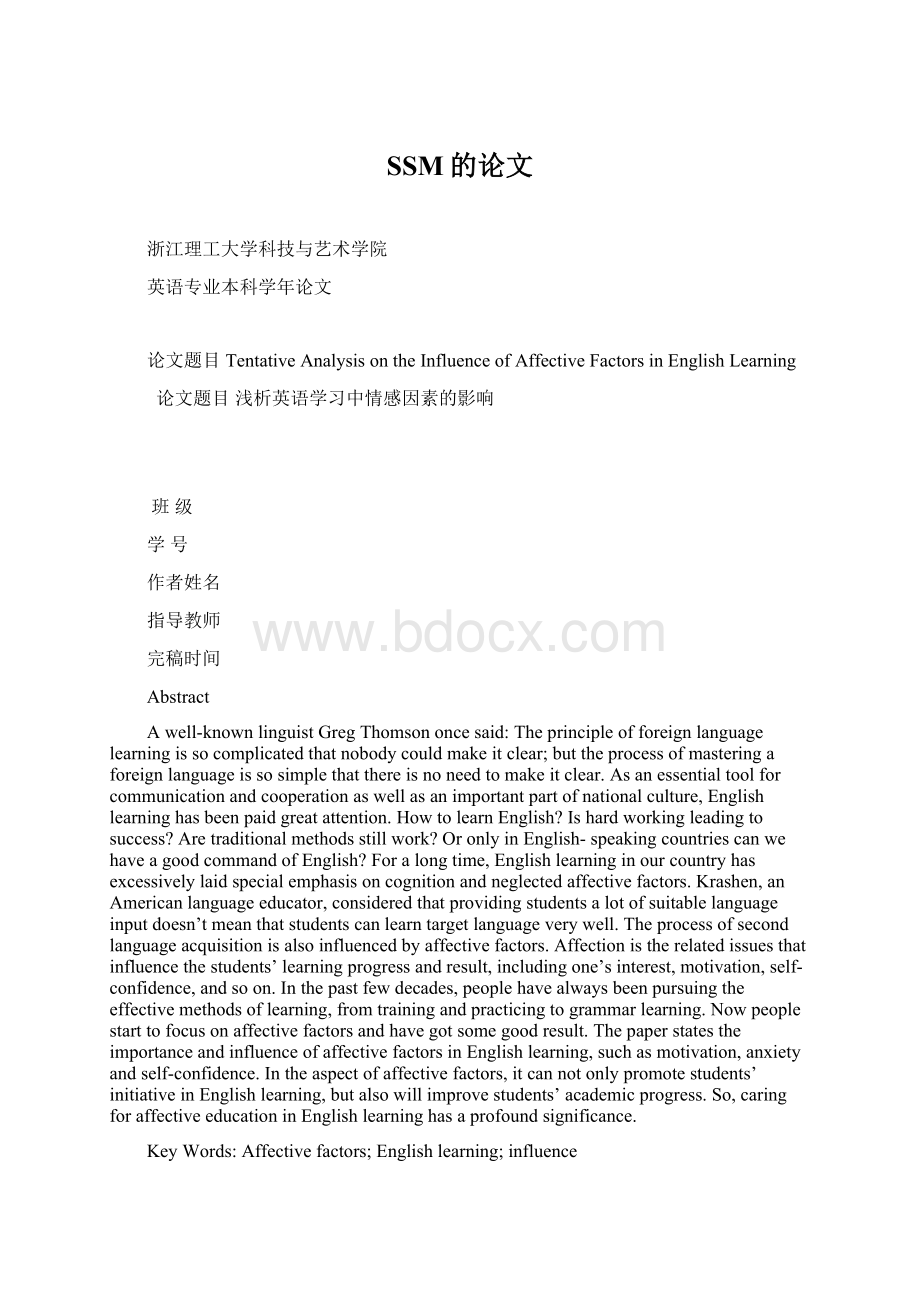SSM的论文.docx
《SSM的论文.docx》由会员分享,可在线阅读,更多相关《SSM的论文.docx(14页珍藏版)》请在冰豆网上搜索。

SSM的论文
浙江理工大学科技与艺术学院
英语专业本科学年论文
论文题目TentativeAnalysisontheInfluenceofAffectiveFactorsinEnglishLearning
论文题目浅析英语学习中情感因素的影响
班级
学号
作者姓名
指导教师
完稿时间
Abstract
Awell-knownlinguistGregThomsononcesaid:
Theprincipleofforeignlanguagelearningissocomplicatedthatnobodycouldmakeitclear;buttheprocessofmasteringaforeignlanguageissosimplethatthereisnoneedtomakeitclear.Asanessentialtoolforcommunicationandcooperationaswellasanimportantpartofnationalculture,Englishlearninghasbeenpaidgreatattention.HowtolearnEnglish?
Ishardworkingleadingtosuccess?
Aretraditionalmethodsstillwork?
OronlyinEnglish-speakingcountriescanwehaveagoodcommandofEnglish?
Foralongtime,Englishlearninginourcountryhasexcessivelylaidspecialemphasisoncognitionandneglectedaffectivefactors.Krashen,anAmericanlanguageeducator,consideredthatprovidingstudentsalotofsuitablelanguageinputdoesn’tmeanthatstudentscanlearntargetlanguageverywell.Theprocessofsecondlanguageacquisitionisalsoinfluencedbyaffectivefactors.Affectionistherelatedissuesthatinfluencethestudents’learningprogressandresult,includingone’sinterest,motivation,self-confidence,andsoon.Inthepastfewdecades,peoplehavealwaysbeenpursuingtheeffectivemethodsoflearning,fromtrainingandpracticingtogrammarlearning.Nowpeoplestarttofocusonaffectivefactorsandhavegotsomegoodresult.ThepaperstatestheimportanceandinfluenceofaffectivefactorsinEnglishlearning,suchasmotivation,anxietyandself-confidence.Intheaspectofaffectivefactors,itcannotonlypromotestudents’initiativeinEnglishlearning,butalsowillimprovestudents’academicprogress.So,caringforaffectiveeducationinEnglishlearninghasaprofoundsignificance.
KeyWords:
Affectivefactors;Englishlearning;influence
摘要
著名语言学家GregThomson曾经说过:
外语学习的原理是如此之复杂,以至于没有人能说清楚;但掌握语言的过程又是如此之简单,以至于不需要说清楚。
作为交流与合作的一项必要工具以及民族文化的一项重要组成部分,英语学习受到人们极大的重视。
如何学习英语?
是不是勤奋就能成功?
传统的方法是否依旧有效?
还是只有在说英语的国家我们才可以很好地掌握英语这一语言?
很久以来,在我国英语学习人们尤其关注认知能力而忽略了情感因素。
美国语言学家克拉申认为,提供给学生大量适宜的语言输入并不意味着学生能够把目的语学好。
第二语言悉得的过程还受到情感因素的影响。
情感是影响学生学习过程和结果的有关因素,其中包括兴趣、动机、自信心等。
在过去的几十年里,人们一直在追求有效的学习方法,从题海战术到语法学习。
现在人们开始注重情感因素并且已经取得了良好的成果。
本文阐述了情感因素如动机、焦虑和自信心在英语学习中的重要性及影响。
情感因素不仅可以促进学生学习英语的积极性,还能提高学生的学习成效。
所以,在英语学习中注重情感教育意义深远。
关键词:
情感因素;英语学习;影响
Contents
Introduction----------------------------------------------------------------------------------------------1
1.GeneralDescriptionofAffectiveFactors---------------------------------------------------------1
1.1TheConceptofEmotion-----------------------------------------------------------------------1
1.2AffectiveFactors--------------------------------------------------------------------------------2
1.2.1Motivation---------------------------------------------------------------------------------2
1.2.2Anxiety-------------------------------------------------------------------------------------2
1.2.3Self-confidence---------------------------------------------------------------------------3
2.TheInfluenceofAffectiveFactorsinEnglishLearning----------------------------------------3
2.1TheCharacteristicsofEnglishLearning-----------------------------------------------------4
2.2SignificantRoleofAffectiveFactors---------------------------------------------------------4
2.2.1EffectsofNegativeAffectiveFactors--------------------------------------------------4
2.2.2EffectsofPositiveAffectiveFactors---------------------------------------------------5
2.3InfluenceofAffectiveFactorsinEnglishEfficiency---------------------------------------5
2.3.1InfluenceofMotivation------------------------------------------------------------------5
2.3.2InfluenceofAnxiety----------------------------------------------------------------------6
2.3.3InfluenceofSelf-confidence-------------------------------------------------------------8
3.FocusonAffectiveFactorstoImproveLearningEfficiency----------------------------------9
3.1ApproachestoReinforceMotivation-------------------------------------------------------10
3.2MethodstoOvercomeAnxiety---------------------------------------------------------------11
3.3MeanstoIncreaseSelf-confidence-----------------------------------------------------------12
4.QuestionnaireSurvey------------------------------------------------------------------------------12
4.1Interview----------------------------------------------------------------------------------------12
4.2ResearchSubjects------------------------------------------------------------------------------13
4.3ResultsDiscussion-----------------------------------------------------------------------------13
Conclusion---------------------------------------------------------------------------------------------15
Introduction
ItiswidelyagreedthatEnglishhasplayedanimportantroleininternationalstageandexertedasignificantinfluenceoncommunicationandconnect.Asaresult,itisanurgentneedtopaymuchattentiontothinkingabouttheappropriatemethodstolearnEnglish.InEnglishlearning,affectivefactorswillbebroadlyconsideredasaspectsofemotion,feeling,moodorattitudewhichconditionbehavior.Inthefieldsofappliedlinguisticsandsecondlanguageacquisition,affectivevarietieshavebeenpaidtoomuchattention.Agreatnumberoflinguistsandscholarshavedeliveredagreatamountoftopicsandargumentsformorethanonehundredyears.However,littleempiricalevidenceisavailabletounderstandmotivationalpatternsincludinganxietyandself-confidenceinChina,atypicalforeignlanguagelearningsetting,wherelearnersuseChineseinmostareasofsociallife.ThisthesisaimstodiscusstheeffectsandinfluencesofaffectivefactorsinChinesestudents’Englishlearningprocessthroughthreemajoraffectivevarieties:
motivation,anxietyandself-confidence.ThethesisistofindoutthewayhowtoovercomethenegativeeffectsduringChinesestudents’Englishlearningprocessinordertoimprovestudyefficiencyandtodeveloptheabilityofself-fulfillness.
1.GeneralDescriptionofAffectiveFactors
One’s“affect”towardsaparticularthingoractionorsituationorexperienceishowthatthingorthatactionorthatsituationorthatexperiencefitsinwithone’sneedsorpurposes,anditsresultingeffectonone’semotions(Dulayetal.,1982).InEnglishlearning,emotionwillbebroadlyconsideredasaspectsoffeeling,attitudeormoodwhichconditionbehaviour.ThereareanumberofaffectivefactorsthatinfluenceEnglishlearning,suchasmotivation,self-confidence,cooperativespiritandanxiety;allthesefactorsareKrashen’s“affectivefilter”.Manyresearchershavepointedoutthatlearners’affectionandstatehaveadirectimpactontheirlearningbehaviourandresults.
1.1TheConceptofEmotion
Arnold(Ed.1999)definesaffectintermsof“aspectsofemotion,feeling,moodorattitudewhichconditionbehaviour”,whileDickinson(1987)describesitasbeingconcernedwiththelearner’sattitudetowardsthetargetlanguageandusersofit,andwithhis/heremotionalresponses.Hesaidthataffectisatermthatreferstothepurposiveandemotionalsidesofaperson’sreactionstowhatisgoingon.
1.2AffectiveFactors
AffectivefactorsareemotionalfactorswhichwillinfluenceEnglishlearning.Theycanhaveanegativeorpositiveeffect.Theoretically,affectisatermthatreferstothepurposiveandemotionalsidesofaperson’sreactionstowhatisgoingon.Ithastodowithaspectsofaperson’semotionalbeing.PositiveaffectivefactorsplayastimulativeroleinEnglishlearning.Forexample,optimisticpersonalityhelpsstudentsactivelytakepartinlanguagelearningactivitiesandgetmorelearningopportunities.Teachersbringstudentswithpositiveaffectiveexperience,whichhelpschangeboringlearningintopleasurablelearning.Negativeaffectioncanrestrainintelligentactivities,affectstudents’normalusageoflearningpotentialityandreducelanguagelearningeffects.Affectivefactorsmaybeasimportantforsuccessfullanguagelearning,ifnotmoreso,thanabilitytolearn.
1.2.1Motivation
Motivationhasbeenidentifiedasthelearner’sorientationwithregardtothegoaloflearningasecondlanguage(CrookesandSchmidt,1991).Peoplearealwaysmotivated;infact,theyareneverunmotivated.Theymaynotbemotivatedtodowhatwewouldprefertheydo,butitcanneverbetrulysaidtheyareunmotivated(Combs,1962).Inpsychology,motivationisaforcethatenergizesanddirectsbehaviortowardagoal(PaulEggen&DonKauchak,1994).Justasaforcemovesanobject,motivationmovesaperson.Morevisualized,ifindividualsaremachines,motivationisastheveryenginethatpowersanddirectsindividuals’behavior.Motivesservethreeimportantfunctions:
first,energizingus(i.e.,turningthekeyandstartingthemotivationalengine),second,directingus(i.e.,pointingusinaparticulardirection),andthird,helpingustoselectthebehaviormostappropriateforachievingourgoals(DonHamachek,1989).Inaword,motivationisaninnerstatethatarousesindividual’sdesireforagoalandmaintainstheireffortsinacertaindirectionandtime.
1.2.2Anxiety
“Psychologicallyspeaking,anxietyreferstotheintenseandenduringnegativefeelingcausedbyvagueanddangerousstimulifromtheoutsideaswellastheunpleasantemotionalexperienceinvolved,suchasanticipationandfear”(WenWeiping,1998),whilelanguageanxietyisthefearorapprehensionoccurringwhenalearnerisexpectedtoperformintheforeignlanguage(Horwitzetal.,1986).Itisassociatedwithfeelingssuchasuneasiness,frustration,self-dou